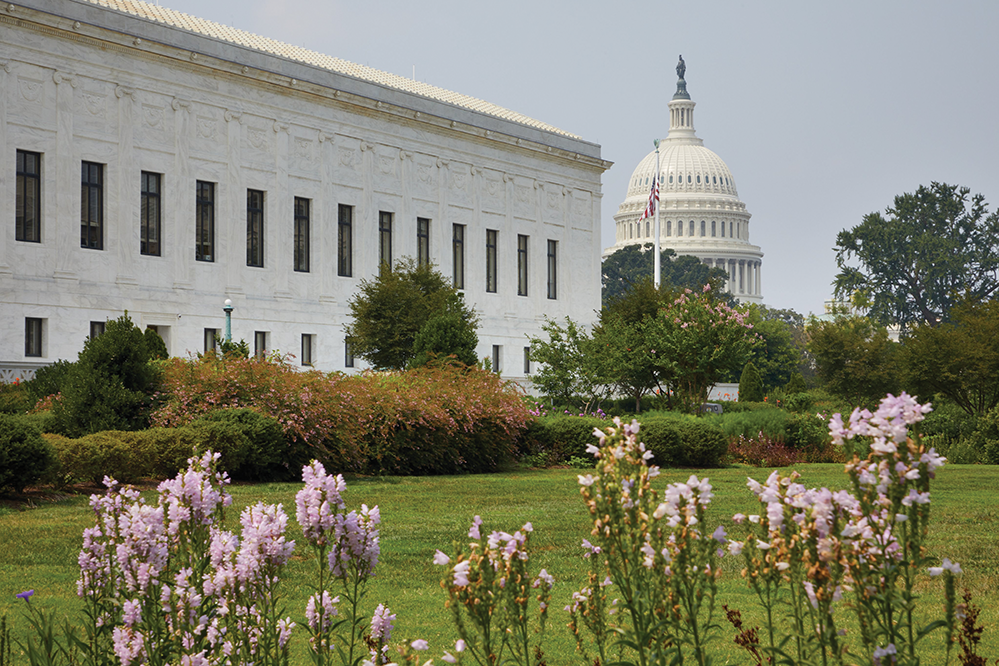Georgetown student activists took to the streets of D.C. last weekend to demand that President Joe Biden’s administration take immediate action to combat the climate crisis.
Activists organized the strike outside the U.S. Capitol Building on Sept. 24 to demand Congress pass a $3.5 trillion climate change bill to establish a Civilian Climate Corps, a plan President Biden proposed that would employ 20,000 people annually to complete sustainability work in the green energy sector. Protesters also called on the Biden administration to use an executive order to stop the construction of the Line 3 pipeline, which would carry toxic tar sand from Canada to Wisconsin.

The strike was organized by Fridays for Future (FFF), an international movement started by climate youth activist Greta Thunberg in 2018 and American University’s chapter of the Sunrise Movement. FFF aims to end climate change while simultaneously creating sustainable jobs. Last Friday’s event was part of a global strike in which over 700,000 people participated.
Attendee Elizabeth Packard (COL ’25) said that the seriousness of the climate crisis and the excitement of an in-person protest inspired her to join the demonstration.
“I just think climate change is just such an urgent topic so I think the faster people get involved, the faster change will happen,” Packard said in a Zoom interview with The Hoya.
At the demonstration, Packard was particularly moved by a “die-in” during the protest, in which participants lay down on the ground to represent those who have died as a result of climate change.
“It’s just a fact and a number that so many people don’t recognize because it’s so hard to visualize, so I found that really powerful,” Packard said.
In the United States, people of color, including Black, Latinx, and Asian Americans are more likely than their white counterparts to be exposed to pollution from all sources including emissions from vehicles, construction, agriculture and restaurants. The crisis also disproportionately affects low-income communities that tend to inhabit natural disaster-prone regions, particularly those exacerbated by climate change.
The protest reminded Willow Volkert (COL ’25) — who also attended the protest — said she believes the university is greenwashing their sustainability policies.
“Georgetown is not at all doing enough. They have no comprehensive sustainability plan even though they claim to have an environmental initiative. It’s complete greenwashing — nothing’s getting done,” Volkert said in a Zoom interview with The Hoya. “It’s especially upsetting, considering the school does have the money to enact these changes.”
According to Meghan Chapple, Georgetown University vice president of sustainability, the university is working towards creating a sustainable campus, including divesting fossil fuel companies and working to decrease energy usage rates.
“The university has already begun to address this with a recent agreement with ENGIE North America to manage utilities and reduce energy consumption on campus,” Chapple wrote in an email to The Hoya.
On Feb. 6, 2020, administrators announced their plan to divest the university’s endowment from fossil fuel investments within 10 years. The announcement came after an eight-year campaign from Georgetown University Fossil Free, a student-led activist organization dedicated to fossil fuel divestment.
Climate change is a global crisis that requires immediate attention across the world, according to Volkert.
“They really spoke at the strike about how the rest of the politicians who weren’t addressing this were acting like children by refusing to talk about this,” Volkert said. “People don’t really see this as big of an issue as it is, so we need to change the narrative and address not this problem, but this crisis.”




















